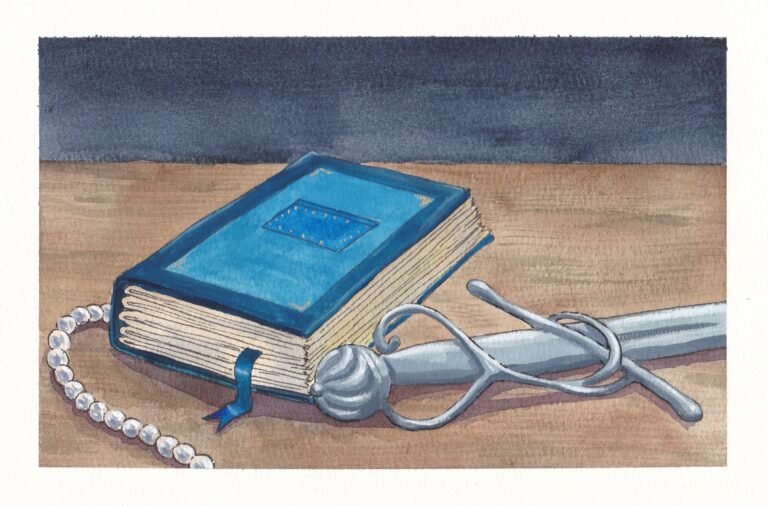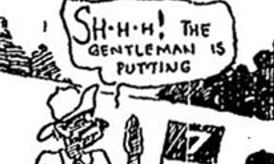I’m not normally a declinist, gloom and doom-ism being the kissing cousin of the absurd optimistic teleology that has also been, strangely, permanently en vogue. But one place where I’m afraid I’m almost entirely pessimistic is the survival of media and art in the digital age.
I come to talk to you about this by way of Peter’s post at the American Scene that wonders aloud whether Trent Reznor’s distribution model is the future of music. Really, though, this is an almost constant point of worry for me. I simply don’t know if movies, music, video games and now ebooks– or, rather, the industries that produce these commodities– can survive, in a world in which anyone with basic computer literacy and the desire to do so can download them.
Peter asks the right questions, though he is more sanguine than I am, I think. As he says, “despite Masnick’s claim that smaller artists can make use of the CwF formula too, they’re unlikely to come close to NIN’s returns without pre-existing access to a Reznor-sized fanbase.” First of all, what should be said is that Reznor himself is unlikely to come close to NIN’s returns, or at least the returns of their heyday. Part of that of course is the fact that Reznor appears past his popular prime as a musician; part of it is the fact that music is becoming increasingly divided into more and more idiosyncratic niches; you just aren’t going to have everybody listening to the same record anymore, or at least, as big of a percentage as once listened to the Downward Spiral. But another reason for this decline is certainly that anybody with a broadband connection can get his music for free while contributing nothing to him, and we should factor that in as well.
More to the point, and more distressingly to those who think digital distribution means the end for the record industry and the beginning of the age of the artist, I think Peter doesn’t say it forcefully enough: of course, an already established artist can have more success offering his music directly to the masses. A large part of the necessity of signing a record deal has always been the marketing and distribution muscle necessary to introduce a band to the public. That’s still the case, even in the era of blogs and MySpace. This is why, incidentally, record companies have generally insisted on signing acts to multiple album contracts; the label’s bargaining advantage is always at its greatest before an artist becomes really well know. There are still some large logistical advantages to being contracted to a label now, and as music is spun off into different delivery systems– think cellphone ring tones– the need for the label actually increases, to have the kind of legal and procedural structures in place in order to ensure the flow of royalties from such revenue streams.
Look, the bottom line here is… the bottom line. Some bands I’m sure can sell a lot of downloads with this model. Whether or not they are doing so in a way that is actually fiscally solvent is a larger question. Are these bands recouping a profit in this model? Is the profit enough to earn them at least a decent living? And is this model upwardly scalable? I think those are important questions. Also, they fail to address the larger problem of downloading illegally. Whether music is being distributed digitally on CDs to stores, or on a computer through (legitimate) downloading, that digital file is out there, and it only takes the one person to upload it to the scene, where it can be downloaded again and again. You only have to look at the PC games industry to see a business that has been laid waste by downloading of digital content. PC games and music are inherently disadvantaged, PC games because the kinds of people who play PC games are the kinds of people who have the skills and desire to illegally download them, and music because the file sizes are so small, and so many people have digital music players. But movie downloading grows by leaps and bounds, and ebooks are very small files as well, so as more and more people purchase ebook readers, I think the publishing industry will face similar peril. (Console video games of almost every system are also capable of being downloaded, although I believe that the technical hurdles to doing so will prevent that industry from ever being significantly threatened.)
Nor do I think a technical solution is coming down the pike. Again and again, the PC games and music companies try new technology to prevent illegal distribution; again and again, the dedicated thieves in the downloading scene thwart them. People being paid to work nine to fives and develop “digital rights management” just can’t compete with an army of dedicated and competitive amateurs. Maybe the funniest (or most depressing, if you’re a music exec) attempt at preventing music piracy was a highly-touted CD-ripping prevention feature that I believe was first applied on an Eminem album. After hundreds of hours of development and surely thousands and thousands of dollars, the system was beaten within a matter of hours, when someone realized that covering a certain portion of the disc with a magic marker bypassed the DRM system.
I hope I’m wrong about the digital future. I want to be. I certainly am not one of those who thinks that music will one day be an entirely amateur enterprise. I think that there would be a lot of negative consequences to such a change. Even gifted amateurs could never have produced Revolver, and while your average editing software for a computer can put what George Martin had to work with to shame, there is simply a level of craftmanship and purpose that I don’t think can be duplicated in an amateur capacity. So like I said, I hope there are alternatives. But I find far too much utopianism concerning the issue. I was once much more amenable, philosophically, to illegal downloading, though I’ve never been much of a downloader myself. I bought a lot of the arguments that you heard: people will discover new bands and songs they like by DLing them for free, then they’ll buy. People will want to support bands they respect so they’ll buy the CD for that reason. People only download if they are gonna get a single song, and it’s not fair for someone to pay fifteen bucks for one song. People like having the feeling of ownership and having the packaging, so they’ll buy after they download. Once people can download for pay, at a reasonable rate, illegal downloading will die off except for some tiny amount.
None of that was true, and of course it wasn’t. What in the end is more powerful in this equation than “free”? Here’s what people really like, when push comes to shove: they really like getting stuff for free that they once had to pay for. They like it more than owning the physical CD and packaging. They like it more than “the sense of legitimate ownership”. They like it more than supporting really cool bands on their way up, they like it more than supporting independent cinema, they like it more than the feeling of satisfaction you get by donating money for an artist you really like. People want to get stuff free, and they can, and as long as that’s the case I see ahead only armaggedon for the music industry, and very troubling times for other forms of digital media.






I’ve often wondered whether the endgame would involve performers of pop music having climb down to earth and suck the same swampwater that classical musicians have been gulping down for ages. The music industry was born of the ability for what had been ephemeral performances to be transformed into commodities. The performances are becoming ephemeral again (or rather so ubiquitous that they might as well be ephemeral) and the music industry as we know it will likely die. The thought of modern pop stars having to wander about playing festivals while hawking for CD sales and donations from a booth like a Renaissance Fair player kind of amuses me. Or at least would amuse me more if I didn’t know so many lives would be ruined by that.Report
I think you’re being overly pessimistic.
“anybody with a broadband connection can get his music for free while contributing nothing to him”.
And yet, not everyone did. He made a large sum of money. Radiohead outright let people pay nothing if they chose with In Rainbows, and yet they made more money on that album that they did with their previous traditional CD Hail to the Thief. I’m perfectly technically capable of getting anything album for free if I wanted to, and yet I don’t. I’ve bought three albums just this week. So perhaps consumers of music have more complex motivations than just trying to get what they want for free.
Now I paid far less for these albums than I would have in the past because I bought them through digital download services (iTunes, Amazon). The cost of music is being driven downward, is this is going to cause artists to make less money. But that’s good for fans of music. This plus the “long tail” means we’re going to have less multi-millionaire megastars and more $60k/year Jonathan Coultons. I’m fine with that, and I’m betting most musicians would be too. Some people no doubt will just get their music for free. But enough people won’t that musicians will still be able to make a decent living, even if the days of “rock star excess” may be numbered.
As to the decline of the PC gaming industry, that’s caused less by piracy and more by having an inferior product than the consoles. Your average gamer wants to buy a console and have it run everything they want to play for years, rather than having to buy a new video card several times over that same period and play constant driver compatibility games. And even among the die-hards who will always prefer PC games, new distribution methods like Steam are making the piracy question moot.Report
I think the comparison of CDs to DVDs is the most instructive one. While I know some movie pirates, movie downloading is not nearly as prevalent as music downloading. I think a big part of that is the price point that DVDs are set at, usually $10-15, even for new releases. CDs are set at that same price point, even though a consumer feels like he or she is getting less (audio only, few or no “extras”, usually a shorter length) on a CD than a DVD. I do wonder what would happen if CDs set a permanent price point in the $5-10 range. I think that the increase in sales would offset the decline in price, but I really don’t know for sure.Report
Some bands I’m sure can sell a lot of downloads with this model. Whether or not they are doing so in a way that is actually fiscally solvent is a larger question. Are these bands recouping a profit in this model? Is the profit enough to earn them at least a decent living? And is this model upwardly scalable?
In the coming years I expect the answers to the above questions will be yes /no / no. But there’s another part of the equation: touring. I think the business model for bands will shift to less time in the studio and more time on the road. Which isn’t as profitable a model, but still should be decently profitable. As for books, I am deeply pessimistic despite personally preferring paper to Kindle.Report
As to the decline of the PC gaming industry, that’s caused less by piracy and more by having an inferior product than the consoles.
Sacrilege!Report